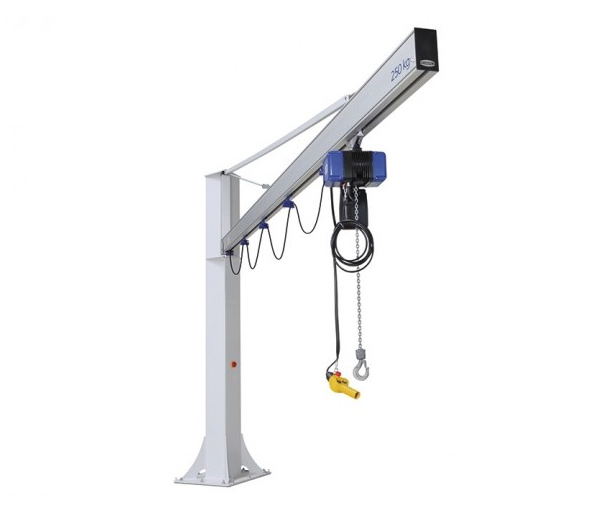
When it comes to lifting and moving heavy loads, jib cranes are among the most versatile tools available. These ingenious devices make material handling easier and more efficient in a variety of settings, from warehouses to construction sites. With their unique designs and functionalities, they can enhance productivity while ensuring safety in the workplace.
Imagine being able to maneuver bulky items with ease—jib cranes offer that capability. They’re not just for big industrial operations; smaller businesses can benefit too! Whether you’re looking to optimise your workspace or streamline processes, understanding jib cranes is essential. Let’s look into the world of these remarkable machines and explore why they’re indispensable in modern industry.
Types of Jib Cranes
Jib cranes come in various types, each designed to meet specific lifting needs. Column-mounted jib cranes are popular for their stability and efficiency. They are fixed to a vertical column, allowing them to lift loads smoothly around the pivot point.
Wall-mounted jib cranes provide flexibility in tight spaces. Attached directly to walls, they maximise workspace while offering excellent range of motion. This makes them ideal for manufacturing facilities with limited floor space.
Our Jib cranes are versatile options for lifting and moving heavy loads. If there is sufficient existing steel work, our wall mounted Jib cranes can be easily attached, effectively saving space. However, in cases where there is no available steel work, our column mounted jib cranes are the ideal solution.
Jib Cranes offer a wide range of uses and pair well with a variety of lifting equipment, such as chain hoists, rope hoists, rope balancers, and lifting devices. The pivoting angle for column installation is 270°, and the crane can also be easily installed freestanding within a room.
The Column Slewing Cranes employ aluminium crane rails for weights under 1,000 kg, ensuring exceptional responsiveness. When lifting loads exceeding 1,000 kg, steel crane rails are utilised.
Each type serves unique purposes but shares a common goal: enhancing productivity and safety in material handling tasks.
Advantages and Uses of Jib Cranes
Jib cranes offer a versatile solution for various lifting tasks in industrial settings. Their design allows for easy maneuverability, enabling operators to lift and transport heavy loads with minimal effort.
One major advantage is their ability to maximise workspace efficiency. By utilising vertical space, jib cranes free up valuable floor area that can be used for other operations.
Column mounted jib cranes are particularly effective in confined spaces. They provide 360-degree rotation, allowing users to access hard-to-reach areas without the need for extensive repositioning.
Wall mounted jib cranes save even more space by attaching directly to structural walls. This option is ideal for workshops where flexibility and accessibility are key requirements.
The integration of low friction transport trolleys enhances load movement along the beam, making it smooth and effortless. Additionally, features like trailing cables ensure power supply without hindrance during operation.
Factors to Consider When Choosing a Jib Crane
Choosing the right jib crane involves several key factors. Start by assessing your lifting needs, including weight capacity and height requirements. Different models cater to varying loads, so ensure you select one that matches your specifications.
Next, consider the type of installation space available. Column mounted jib cranes are ideal for areas with limited floor space, while wall mounted jib cranes can be attached directly to existing structures. Think about how much flexibility you need in movement as well.
The ease of mobility is another essential factor; look for features like an easy-to-move pivot bearing or a low friction transport trolley for smoother operation. Additionally, evaluate power options such as trailing cables or conductor lines if electrical components are involved.
Don’t overlook safety certifications and maintenance requirements to ensure compliance with regulations and longevity in usage.
Maintenance and Safety Tips for Jib Cranes
Regular maintenance is crucial for the longevity of jib cranes. Inspect all components frequently, focusing on the pivot bearing and the transport trolley. Look for signs of wear or damage to ensure smooth operation.
Lubricate moving parts regularly to reduce friction and enhance performance. A low-friction transport trolley can significantly improve efficiency if properly maintained.
Safety should always be a priority when using jib cranes. Make sure operators are trained in proper handling techniques. Establish clear communication signals to avoid accidents during operation.
If your setup involves a trailing cable or conductor line, check these connections routinely for any fraying or exposure that could lead to malfunctions.
Always adhere to weight limits specified by manufacturers. Overloading can cause serious safety hazards and equipment failure, so remain vigilant about load management practices.
Significant Returns
Jib cranes are essential tools in various industries, enhancing efficiency and safety during material handling. Whether you opt for column mounted jib cranes or wall mounted jib cranes, each type offers unique benefits tailored to specific needs.
By understanding the advantages of these lifting solutions—like their easy-to-move pivot bearing systems and low friction transport trolleys—you can make informed decisions that improve workflow in your operations. Additionally, features like trailing cables and conductor lines further enhance functionality while ensuring a safer working environment.
Choosing the right jib crane involves considering factors such as space limitations, load capacity, and intended use. Regular maintenance is vital for longevity, along with implementing safety measures to protect operators.
Investing time into selecting the appropriate equipment will yield significant returns in productivity and efficiency. Jib cranes provide not only versatility but also reliability across different applications in warehouses, factories and construction sites.

